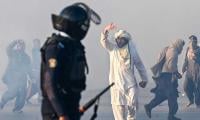GENEVA: A UN expert called Monday for an international investigation into “atrocity crimes”, including genocide, committed in Iran against religious minorities and amid a purge of dissidents in the 1980s.
Javaid Rehman, the UN’s independent special rapporteur on the rights situation in Iran, said there should be “no impunity for such gross human rights violations, regardless of when they were committed”. “The Iranian regime and its leaders should not be allowed to escape the consequences of their crimes against humanity and genocide,” he added.
The expert, whose mandate ends on July 31, said in a statement that the “atrocity crimes” of summary, arbitrary and extra-judicial executions in 1981-1982 and in 1988 “amounted to crimes against humanity of murder and extermination, as well as genocide”. Women, some reportedly raped before being killed, and numerous children were among those executed, he said.
Rehman lamented that “the targeting and victimising of religious, ethnic and linguistic minorities and political opponents continued with complete impunity during, and since, the first decade of the establishment of the Islamic Republic in 1979”.
He highlighted in particular attacks on the Bahai -- Iran’s largest non-Muslim minority -- which he said was “targeted with genocidal intent and persecution”. Human Rights Watch warned back in April that Iranian authorities’ persecution of the Bahai minority constituted a crime against humanity. Unlike other minorities, Bahais do not have their faith recognised by Iran’s constitution and have no reserved seats in parliament.
Rehman, who was appointed by the UN Human Rights Council but who does not speak on behalf of the United Nations, pointed to reports that more than 200 Bahais had been executed or murdered since the early 1980s, while thousands had been arrested. Amid Iran’s crackdown on “anti-Islam” groups, he also suggested that Marxists, atheists and other non-believers had also been subjected to genocide.
Rehman’s report also pointed to the alleged extrajudicial executions of thousands of mainly young people across Iranian prisons within a few months in the summer of 1988, just as the war with Iraq was ending, describing it as a “shocking tale of brutality”. Those killed were mainly supporters of the People’s Mujahedin Organization of Iran -- a group considered a terrorist organisation by Iran that backed Baghdad during the conflict. The expert lamented that “the Iranian government continues to deny the ‘atrocity crimes’, perpetrators have not been brought to justice”. “An independent international investigative and accountability mechanism for Iran is absolutely essential.”
Ukrainian President Volodymyr Zelenskyy and his French counterpart Emmanuel Macron, in February —AFP/FilePARIS:...
A boy poses for a picture under a massive Bangladeshi flag, during a flag rally three days ahead of the country's 50th...
Retirees practice "Cola Ball" with music, an invented community activity in central Beijing. — Reuters/FileBEIJING:...
Pope Francis looks on during the Jubilee audience in Paul VI hall at the Vatican, February 1, 2025. — ReutersVATICAN...
Chinese Defence Ministry spokesperson Wu Qian attends a press briefing in Beijing, China August 31, 2023. —...
Firefighters battling a wildfire in Ofunato city of Iwate Prefecture.—AFP/FileTOKYO: Japan´s worst wildfire in more...







